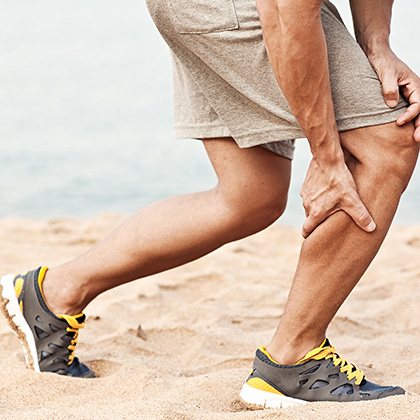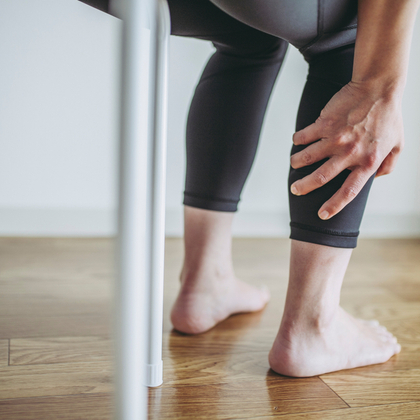Also known as Willis-Ekbom disease, restless legs syndrome (RLS) is thought to affect up to 10 per cent of people in the UK, with women twice as likely to develop the condition as men (i). Middle-aged people are the most likely to develop RLS, but anyone of any age can be affected, even children. About one in five pregnant women develop RLS during the later stage of their pregnancy too (ii).
RLS gives you an irresistible urge to keep moving your legs, and is often worse when you’re resting and at night or if you’re sitting in a confined space such as the theatre or in a car. The urge to move your legs is caused by unpleasant sensations, often described as crawling, twitchy, itchy, uncomfortable or painful (by moving the legs, the sensations subside – but they usually return when you stop moving your legs).
However, while its name suggests it affects just the legs, RLS can also affect your arms, torso, head and other parts of the body. Some people are mildly affected, while others have such severe and frequent symptoms that it affects their daily lives.
On top of RLS, it’s thought that more than 80 per cent of sufferers also have a condition called periodic limb movements in sleep (PLMS, also called period limb movement disorder or PLMD), which means their legs move suddenly and involuntarily while they’re asleep (though sometimes this can happen while they’re awake) (iii). Both RLS and PLMS can disrupt your sleep significantly.
What causes RLS?
In most cases of RLS there is no known cause. This type of RLS is called primary or idiopathic. This is most common in people under the age of 40 and often runs in families. Some experts believe it may have something to do with an imbalance of brain chemicals called neurotransmitters, particularly one known as dopamine (iv). Indeed, levels of dopamine tend to fall at the end of the day, which may account for why RLS symptoms can be worse at night.
Secondary RLS, on the other hand, can start suddenly and is usually linked with a medical condition (examples include iron-deficiency anaemia, underactive thyroid, fibromyalgia, diabetes, Parkinson’s disease and rheumatoid arthritis). Certain medicines can make the symptoms worse too, including some antidepressants, some antihistamines, blood pressure medicines called calcium channel blockers, the bipolar treatment lithium and antipsychotic medicines.
In terms of lifestyle, there are theories that smoking and drinking too much alcohol or caffeine may trigger RLS, as well as being overweight or obese, not doing enough exercise and being under too much stress (v).
Are there any treatments?
If you have been diagnosed with mild RLS, your GP may simply advise that you change your lifestyle (see Tips to ease RLS). More moderate or severe RLS symptoms, however, are usually treated with medication.
These include prescription medicines that top up the levels of dopamine in your brain, such as those used to treat Parkinson’s disease. If your RLS gives you pain, you may be prescribed mild opiate-based painkillers or a pain relief medicine that’s also used to treat epilepsy.
If, on the other hand, your GP discovers you have iron-deficiency anaemia, a course of iron tablets may put a stop to your RLS symptoms.
Tips to ease RLS
There are lots of things you can do to help ease the symptoms of RLS, including the following:
Give up smoking
Smoking is generally considered to be a risk factor for RLS. If you’ve found it difficult to quit in the past, consider using a stop smoking aid, such as patches, gum and lozenges.
Cut down on stimulants
Make it a rule to avoid substances such as caffeine and alcohol – if you can’t cut them out altogether, stop having them in the evening.
Get into good sleep habits
Try to go to bed and get up at the same time each day, and don’t be tempted to nap during the day, even if you’re tired. Taking a hot bath before going to bed may help to soothe RLS symptoms too. Discover more on sleep and insomnia in our helpful guide.
Exercise in moderation
Regular exercise during the daytime may help to reduce the symptoms of both RLS and PLM, but avoid being physically active too close to bedtime. Pace yourself when you’re exercising and don’t push yourself too hard. Try taking a walk at lunchtime, and if you spend a lot of your day sitting down, have a five-minute walking and stretching break every hour.
Drink plenty of water
Dehydration may give you the urge to move your legs, which may explain why some people find drinking a glass of water helps in the short term (vi). Overall, try to make sure you drink enough water and other decaffeinated drinks during the day.
Massage your legs
Use any opportunity during the day and evening to give yourself a gentle leg massage, as some people with RLS say this helps. Any type of relaxation may also be beneficial, such as meditation, t’ai chi, yoga or deep breathing exercises.
Distract your mind
Instead of spending your evening worrying about whether or not you’ll be able to sleep when you go to bed, try to distract yourself by watching TV, listening to music or reading a good book.
Regulate your bedroom temperature
Using an electric blanket may help to soothe your legs when you’re in bed, but make sure your bedroom isn’t too hot, as being too hot can make it hard for you to get to sleep.
Natural remedies for RLS and leg cramps
If you suffer from RLS or leg cramps, there are a few natural supplements that may provide some relief of your symptoms.
Magnesium
There’s some evidence that taking magnesium supplements may be helpful for RLS and PLMS symptoms, with one study suggesting symptoms may improve after taking magnesium for four to six weeks (vii). As it’s necessary for muscle relaxation, it may also help with leg cramps, with one study suggesting magnesium supplements may help reduce leg cramps in pregnancy (viii).
Fish oils
The omega-3 fatty acids found in fish oils may also help to improve leg health in general, including boosting circulation, and may be particularly beneficial for people who don’t regularly eat oily fish.
B vitamins
Several of the B vitamins are needed for muscle and nerve function, and folic acid is sometimes also recommended for RLS, as there’s some evidence it may help to reduce the symptoms (ix). Researchers have also suggested vitamin B12 may help relieve the symptoms of RLS (x), while others have found that vitamin B complex supplements may help to reduce the frequency, intensity and duration of night-time leg cramps in older people with high blood pressure (xi).
Managing restless leg syndrome can be challenging, but these step should help to make it a little easier. For even more articles on a range of common health conditions, feel free to visit our health library.
References:
-
Available online: https://www.nhsinform.scot/illnesses-and-conditions/brain-nerves-and-spinal-cord/restless-legs-syndrome
-
Available online: https://www.nhs.uk/conditions/restless-legs-syndrome/
-
Available online: https://www.sleepfoundation.org/restless-leg-syndrome
-
Available online: https://patient.info/bones-joints-muscles/restless-legs-syndrome-leaflet
-
Available online: https://www.nhs.uk/conditions/restless-legs-syndrome/causes/
-
Available online: https://www.epda.eu.com/about-parkinsons/symptoms/motor-symptoms/restless-legs-syndrome/
-
Hornyak. M, Voderholzer. U, Hohagen F, et al. Magnesium therapy for periodic leg movements-related insomnia and restless legs syndrome: An open pilot study. Sleep. 1998;21:501-505. Available online: https://academic.oup.com/sleep/article/21/5/501/2725976
-
Dahle. LO, Berg. G, Hammar. M, et al. The effect of oral magnesium substitution on pregnancy-induced leg cramps. Am J Obstet Gynecol. 1995;173:175-180. Available online: https://www.sciencedirect.com/science/article/abs/pii/0002937895901868
-
Botez. MI. Folate deficiency and neurological disorders in adults. Med Hypotheses. 1976;2:135-140. Available online: https://www.sciencedirect.com/science/article/abs/pii/0306987776900682
-
O'Keeffe. ST. Restless legs syndrome: a review. Arch Intern Med. 1996;156:243-248. Silber MH. Restless legs syndrome. Mayo Clin Proc. 1997;72:261-264. Available online: https://pubmed.ncbi.nlm.nih.gov/8572833/
-
Chan. P, Huang. TY, et al. Randomized, double-blind, placebo-controlled study of the safety and efficacy of vitamin B complex in the treatment of nocturnal leg cramps in elderly patients with hypertension. J Clin Pharmacol. 1998 Dec;38(12):1151-4. Available online: https://pubmed.ncbi.nlm.nih.gov/11301568/
Related Posts
Disclaimer: The information presented by Nature's Best is for informational purposes only. It is based on scientific studies (human, animal, or in vitro), clinical experience, or traditional usage as cited in each article. The results reported may not necessarily occur in all individuals. Self-treatment is not recommended for life-threatening conditions that require medical treatment under a doctor's care. For many of the conditions discussed, treatment with prescription or over the counter medication is also available. Consult your doctor, practitioner, and/or pharmacist for any health problem and before using any supplements or before making any changes in prescribed medications.

Christine
Christine Morgan has been a freelance health and wellbeing journalist for almost 20 years, having written for numerous publications including the Daily Mirror, S Magazine, Top Sante, Healthy, Woman & Home, Zest, Allergy, Healthy Times and Pregnancy & Birth; she has also edited several titles such as Women’ Health, Shine’s Real Health & Beauty and All About Health.
View More



